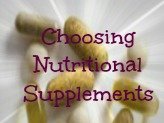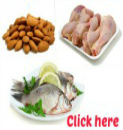What are Protein Supplements?
Protein supplements are protein food products and sources which are used by athletes and body builders to meet their daily recommended protein requirements. These supplements help to increased muscle mass while undertaking regular exercise.
They also help in building lean muscle and faster muscle recovery. Protein food supplements usually contain 20-30 grams more than the protein in one serving.
They are also fortified with minerals and vitamins.
These products come in different flavors from fruit flavored to peanut butter flavored to cream and cookie flavored.
The types of protein supplements are protein bars, protein powders, meal replacements and weight gainers.
Sources of Protein Used in Protein Supplements
Whey Protein - milk protein has 20 percent whey protein. Whey is a byproduct of cheese production and was initially thought to be a waste product. Today whey protein is the most common protein source for making protein supplements.
Whey protein is very rich in valine, isoleucine and leucine- these are muscle building amino acids. It is fast digesting and is low in arginine and glutamine.
Casein Protein - casein is a slow digesting protein consists 80 percent of all the protein milk. It is very common in weight gainers because it has 92% protein and has quit a thick taste.
Despite the fact that it has a lower BV, it is efficient for muscle building. This protein source encourages the use stored
fats and carbohydrates for body energy.
Whey Isolate - whey isolate has 90-98 percent protein. It is a good quality protein source and thus is an expensive type of whey protein. Per serving, whey isolate possess less fat and lactose than whey concentrate.
Whey concentrate - this contains 70-85 percent protein. It possesses more lactose and fat, but takes less processing time. It is thus therefore cheaper than other whey family members.
Whey protein blends - these blends are cheaper than whey isolate. Whey protein blends are special in that they have both whey and isolate concentrates. When compared with whey concentrates, they have a high protein percentage.
Egg Albumin - This is the egg white. It has a high rating of essential amino acids than non-essential ones, thus it is very popular to body builders. Eggs are the best option for lactose intolerance individuals. In the circles of natural protein, eggs are the king because they have less cholesterol and are high in essential amino acids.
Soy protein - This is an average amino acid protein. It is a high quality protein but not as efficient as casein protein or milk. It is fast digesting and thus not a good option for muscle builders.
Other protein sources include soy protein isolate, goat milk protein, wheat protein, pea protein, and complete milk protein.
Benefits of Using Protein Supplements
Protein supplements are a cheaper and easier option to meet your daily recommended requirements. You cannot compare the cost of these products with other protein sources such as fish and beef.
Many athletes take between 5-8 small portions
of protein meal every day. Preparing all these meals would consume a lot of time. When you use protein supplements, they require very little preparation time.
They are usually fortified with vitamins and minerals. This means they have extra benefits to the body.
The various protein sources offered by these supplemets are more balalnced and complete.
They are available in different flavors. Thus you can choose your favorite flavor, unlike the blandness that comes with protein diets.
Some like whey protein have a high biological value (BV) than real food.
It is not very practical to consume enough proteins in your meals every day. For this reason many sports persons prefer to use supplements because they are easily accessible and easy to prepare.
Some of these supplements are not temperature sensitive, thus they do not require refrigeration or heating.
Supplements are
portable; this means you can carry them wherever you go. This can save you a lot of
money and hustle.
Types of Protein Supplements
Protein-supplements are available in many types including protein powder, weight gainers, protein bars and meal replacers.
These supplements
are fortified with minerals and vitamins. Some of these flavors include cream,
cookie, fruit and peanut butter.
Meeting the daily protein requirement is an important part of everyone’s life. However, it is not uncommon for many individuals to fall short of meeting this requirement. This is where protein supplementation comes handy.
You can easily fulfill your proteins needs by making informed foods choices.
You must have noticed that many high protein foods have a high fat content. Therefore, a restricted choice of foods is almost inevitable if you want to keep your health far from the risks associated with excess fats.
Supplements helps you achieve the recomended protein intake without unnecessary fat increase in the body.
All products are made differently and thus are not equal. Choosing from the many brands of protein shakes and powder in the market can be overwhelming and a difficult decision to make.
Avoid products that you do not trust, go for familiar brands that have a record of high quality and safe products.
What is Protein?
Protein is made up of a series of amino acids that are joined together like a chain. Amino acids are the primary source of nitrogen in the body. A positive nitrogen balance is necesarry for normal muscle growth and repair. Protein is among the macronutrients that provide energy in the body.
Besides promoting normal muscle growth and development, protein has aditional roles.
Functions of Protein in the Body
- Preserves muscle tissues during cuts.
- They are energy sources when the body has less carbohydrates.
- Keeps a balanced PH level in human blood
- Is necessary for proper regulation of the body’s fluid balance.
- Chemical reactions in the body requires protein.
- Builds and maintains proper hormone levels.
- Supports normal functioning of immune system.
Protein and Muscle Growth
An increased protein intake helps to increase the lean muscle mass. The body is usually in a continous "protein turnover." This means that muscles and tissues are repaired and replaced continously. A positive nitrogen balance helps the body to maximize muscle tissue repair and replacement.
The body gets confused when you eat less protein than required. In this case the body cannot repair or replace muscles as it needs to. Other functions like blood PH balance and hormone regulation are compromised.
Bodybuilders, endurance athletes and other people involved in intense training need to replace and repair more muscle tissues than normal. Thus they need more protein intake.
How Much Protein Should I Take
Read through the label to determine
the serving size and amount of protein per serving.
Choose
a product with at least 15 grams of protein.
The recommended daily intake is 60-80 grams. It is okay as well if your doctor recommends a different intake- remember a doctor's advice must always have its way.
Your product of choice should come from a protein source you
like; be it whey, soy, eggs or other sources. Ensure that it has a short list of ingredients, with less than 5 grams of
fat.
The
product should be 14 to 25 grams of protein, and 150 to 250 calories
with less than 15 grams of sugar (sugar-free is preferred).
Protein Related Articles
Whey protein - This is a dairy protein type isolated from whey. It is a liquid substance made as a by product of cheese production.








New! Comments
Have your say about what you just read! Leave me a comment in the box below.